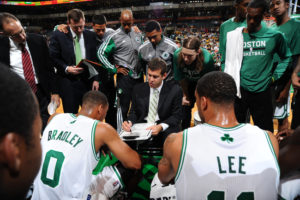
Have you ever thought about what needs to happen for your team to “win the timeout”? NCAA.com reports that “Possessions after timeouts account for 15-18 percent of possessions in a game. The worst teams score around .7 ppp. Average teams score around .85 ppp. The best score more than 1.0 ppp. And there are many teams who execute better within seconds of receiving advice from the coaching staff.”
Brad Stevens, the head coach for the Boston Celtics, is known for having his team run highly successful plays “After a Time Out” or ATO. How can you “win the timeout”? Answer: If you think about the situation that created the timeout, there are certain things you can do, as a coach, to give your team the best chance for a successful play immediately following the timeout.
Why was the timeout called?
To slow your opponent’s momentum and regroup your team? Or is it the other way around and you are on a run so the opposing coach wants to slow you down? Whatever the reason for the timeout, you can use it to your advantage.
For example, if you are on a roll and the other team is trying to slow you down… why not switch up something when you come out of the timeout? Something that is different from what you have been doing could cause enough confusion on the other team for you to get a steal or force a bad shot.
Doing something unexpected is always a good tactic… as long as it is something you have practiced and that uses your team’s strengths.
Aside from the “unexpected”,
what else can we do to “win the timeout”?
HUSTLE. It can demoralize the other team if you show them that you are not tired (even if you are) by hustling to your bench. It also gives you an extra second or two together that the other team doesn’t get (because you arrive at your bench sooner).
3 PART TIMEOUT. If you are organized as a team, you will be able to accomplish more during your timeout. For example, I like to use a 3 part timeout process which consists of (1) Feedback, (2) Tactics and (3) Motivation.
(1) Feedback is a quick check of the status of your team. Where is their head at? Are they confident and engaged in the game? How tired are they and does anyone need a quick rest? This should not take long, maybe a few seconds, but you want to address any problems they are experiencing on the court.
(2) Tactics. This is typical timeout actions… drawing up plays, switching defenses, whatever you need to do to gain an advantage.
From NCAA.com… Advance scouting, game observation and gut instinct help coaches make the right call in a huddle. Clemson’s Brad Brownell is in his 15th season as a head coach. Over the years, he’s learned that the less information he heaps onto his players in a timeout, the better.
“A clear, concise message is important.” he said. “In a shorter timeout of 30 seconds it might be just giving them one thought as it pertains to what they’re trying to defend, preparation for something that could happen, anticipating, a couple of different play calls or whatever it is.”
(3) Motivation is getting your team excited to execute the plan you have laid out for them after the timeout. If you are not getting a strong response, this is your opportunity to “get them on board’ or make a slight change to the plan. By this point in the timeout, you probably won’t have much time and it is good to have a chant or yell that your team executes at the end of every timeout that gets them going. Again, this should be something that has been practiced so you know how the team will react.
Bottom Line…

Will this guarantee that you will “win the timeout”? No. All it will do is give you a framework so that you and your team can do their best work. You never know what the competition will do… they may have even read this article too. All you can do is prepare your team and make the best use of the time you are given. That way you at least have a good chance to “win the timeout”. Now, 1-2-3… GO TEAM!

 – excerpted from How Ronald Reagan Changed My Life by Peter Robinson
– excerpted from How Ronald Reagan Changed My Life by Peter Robinson